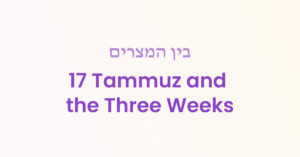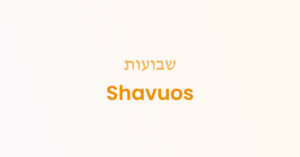We have just completed the awe-inspiring days of Rosh Hashana, when Hashem decided what will happen to us in the upcoming year.
Chazal teach us that although our judgment was “written” on Rosh Hashanah, our judgment will not be “sealed” until Yom Kippur.1 Only the judgements for the full Tzaddikim and full Resha’im were finalized on Rosh Hashanah, but the judgements for Beinonim – regular people like us – have not yet been finalized.
So what can we do between now and Yom Kippur to ensure that we’ll be sealed in the Book of Life?
What can we do now to make sure that we’ll be sealed in the Book of Life?
As we explained before Rosh Hashana, the more we show Hashem that we care about revealing His Kingship in this world, the more we merit to be written in the Book of Life. If we show Hashem that we truly care abut His global mission for this world, then He sees we are His loyal “employees” and He will “re-hire” us for the coming year.
But as much as Hashem wants to see our inner passions, aspirations alone are not enough. We need to translate those aspirations into concrete acts of teshuva.
Inspiration is not enough enough. We need to translate those aspirations into concrete acts of teshuva.
A Test of Commitment
The Sifsei Chaim2 teaches us that the Aseres Yimei Teshuva were given as a test for the Beinonim – the “regular” people like us who are neither fully righteous nor fully wicked.
If we utilize these 10 days to make real concrete steps in our personal growth, this proves to Hashem that the aspirations we felt on Rosh Hashana were really sincere. But if, chas veshalom, a person ignores this test of the Aseres Yimei Teshuva, and continues his regular life as before, it calls into question whether his aspirations on Rosh Hashana were really sincere.
If we utilize the Aseres Yimei Teshuva for growth, this proves to Hashem that the aspirations we felt on Rosh Hashana were really sincere.
During these days before Yom Kippur, Hashem is trying to see: Was it all just lip-service when we said we wanted to fulfill His mitzvos? Or did we really mean it?
Now is the time to put our aspirations into action.
A Yearly Problem
Year after year, many of us find ourselves making the same resolutions again and again. I’ll stick to my diet. I’ll never scream at my kids again. I wont speak lashon hara any more.
If we were so committed to changing last year, what went wrong? Why do we fall into the same traps again and again?
If we were so committed to changing last year, what went wrong?
As much as we’re committed to change, there’s one thing that we sometimes forget: We’re human. And humans are creatures of habit. If last time you passed by the cookies, you weren’t able to resist, what makes you think it will be any different next time? If last week you weren’t able to hold back the words you said in anger, how do you know you’ll be able to stop yourself next time?
If you’re counting on your current feelings of inspiration to pull you through, you may be in for a surprise. Yes, there are times when we feel inspired, but inspiration is hard to maintain. Inspiration fades over time, and we can’t count on it to pull us through every time we face a struggle.
So what can we do to ensure that we wont fall into the same traps again and again?
Building Fences
One way to dramatically increase your chances of success is by making “gedarim” (fences) for yourself. Just as you might build a fence around your house to keep out dogs, thieves, and unwanted visitors, we must build fences around ourselves to keep out the Yetzer Hara. It’s not enough to expect ourselves to say “no” to the yetzer hara; we must use techniques to make sure the Yetzer Hara stays far, far away.
One way to dramatically increase your chances of success is by making “gedarim” (fences) for yourself.
If you find yourself eating too many cookies, don’t leave the cookie jar on the counter. Put it in a cabinet so it’s out of your view. If you’re having trouble keeping your mouth closed, commit to giving 50 cents to tzeddakah every time you say something you shouldn’t. If you have trouble waking up on time for davening, arrange to meet a chavrusah right before davening so you’ll have an extra motivation to come on time.
If we are serious about change, we can’t just rely on our fleeting moments of inspiration to keep us going.
If we are serious about change, we can’t just rely on our fleeting moments of inspiration to keep us going.
The Sifsei Chaim3 explains that by building gedarim (fences), we are acting as a Chacham (wise person).
Chazal teach us: “Aizehu Chacham? HaRo’eh Es HaNolad – Who is wise? Someone who sees what’s going to happen in the future.”4 No, he’s not a prophet; rather, a wise person is self-aware enough to realize that if he doesn’t build gedarim (fences) for himself, it’s almost certain that he will sin again in the future! You were a sincere person with Yiras Shamayim the last time you slipped up, so apparently your Yiras Shamayim was not enough to stop you. Obviously, then, you will need to add something new into the picture if you want the outcome to be different next time.
Will power alone is not enough to ensure lasting change.
Will power alone is not enough to ensure lasting change.
When we make gedarim for ourselves, we are showing Hashem that we are really serious about changing our habits. We are really sincere about everything we said and felt on Rosh Hashana, and we really do want to reveal Hashem’s kingship in this world by doing His Will.
This week, during the Aseres Yimei Teshuva, let’s try to come up with a small, concrete action plan we can take to show Hashem that our aspirations to grow are really sincere.
Sources: [1] Rosh Hashana 16b; [2] Sifsei Chaim Moadim Vol. I. pgs. 98 and 243; [3] ibid. pg. 47; [4] Gemara Tamid 32a
Your Challenge
Think of 1 area in your life where you’d like to improve.
Choose 1 small, concrete commitment you can take upon yourself to improve in that area.
In addition to taking on a commitment, try to add on some type of “geder” (fence) to increase your chances of success. (Optional)
Resolve to keeping your commitment (bli neder) until the end of Sukkos.
For example:
- If you want to be more careful with your speech (avoiding lashon hara, negativity, or complaints), choose 1 hour each day when you’ll be extra careful. Set an alarm on your phoneto remind you every day when that hour begins.
- If you want to become a more giving person, commit to doing at least 1 act of kindness each day, and keep a chart by your bed where you can check off at the end of each day if you did it.
- If you want to get to shul on time, commit to arriving at shul 15 minutes early and arrange a brief daily chavrusah with a friend during that time.
Questions for Discussion
- Why does Hashem “write” our judgment on Rosh Hashanah, but only seal it 10 days later on Yom Kippur? Why not just write and seal the judgement on the same day?
- What techniques have you personally used in the past to successfully change a bad habit? How did you motivate yourself to change?
- What techniques have you personally used in the past to take on a new mitzvah or good habit? How did you motivate yourself to do it?
- Who is a Beinoni? If a Beinoni is someone who has, for example, 500 mitzvos and 500 aveiros, then if he does just 1 mitzvah during the Aseres Yimei Teshuva, it would tip the scales in his favor. Is that really how it works?





